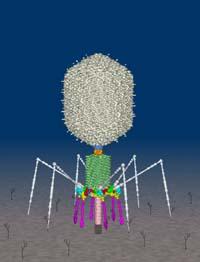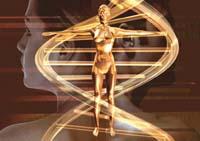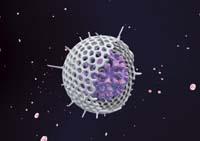All viruses are not bad

Viruses are the simplest beings. In the image, structure of the virus T4. (Picture: Purdue University)
To put ourselves in the place that viruses deserve, the first thing to know is that they are owners of a secret: they discover the origin of life. This is the vision with which scientists work. They are no longer considered as harmful parasites, but as keys to understanding the origin of life. They are probably the base of the cell.
In fact, viruses are the simplest beings. They only contain genetic material (DNA or RNA) and a protein wrap (catheter) that surrounds it. Without the "help" of another living being, they are not able to reproduce, so for some viruses are not alive. Aside from this question, it is undeniable that, if they are not within another living being, they are inert, lifeless. But they are able to advance.
They are totally parasitic and, to reproduce, they must first enter the interior of a cell. Subsequently, they use the cell components to make their genetic material and catheter, generating new specimens of virus inside the cell. Sometimes, this process is harmful to the cell and, therefore, to the whole organism. It is said then that the organism is infected and the medicine tries to find out the ways to avoid and overcome the infection.
The most primitive beings
But from another point of view, it is admirable to advance with so few ingredients. They only have a fundamental basis, and therefore scientists believe that they can be the root of the genealogical tree of the living. Its genetic material is special: although the rest of the living beings are based on DNA, some viruses store their genetic material through a molecule simpler than DNA, which is RNA. Therefore, it seems that they are the most primitive beings, that is, the first living.
In addition, the DNA of viruses with DNA is different from the rest of living beings. DNA is formed by four bases, one of them is thimine, except in viruses. One of the main differences between RNA and DNA is that viruses replace urazyl. Thus, according to several researchers, viruses are the inventor impression of DNA.
Besides being protagonists of the first steps of life, it seems that later they had an important participation in evolution. The first living beings were unicellular and, where appropriate, the eukaryotic cell that would be formed from a unicellular organism infected by a virus, that is, the type of cell containing animals, plants and fungi, more complex than the previous one. So somehow we owe to viruses.
Only that E: Much of our DNA is inherited from viruses. That is, many of our genes are remnants of viruses. They have even been fundamental in human evolution. In fact, organisms that have been able to cope with virus attacks have endured and others have been lost.

In addition, viruses have a great influence on the most important physiological functions of infecting organisms, such as embryo development and immune response. Thus, among other things, the embryo develops as a result of the influence of viruses and functions as the immune system does and not otherwise.
On the other hand, although it seems paradoxical, viruses protect us from diseases. Keep in mind that there are 10 31 different viruses, the diversity of viruses is greater than the sum of all living beings from other realms. Well, only some of them are pathogens, in particular about 200 are harmful to the human being. But many others are beneficial. And is that the expression “the enemies of our enemies-€ are our friends-€? It is perfectly correct when we talk about virus.
Use for benefit

Researchers are learning how to use viruses for our benefit. Some viruses, bacteriophages, are actually enemies of bacteria and doctors begin to use them in some treatments instead of antibiotics. It is being shown that they can also be useful against cancer. Parbobirus, for example, do not harm, but have seen that they are able to destroy tumor cells; now they just need to know how to use them.
Finally, they are a valuable tool of gene therapy, since the researchers use it as gene transporters. In fact, when they want to introduce a foreign gene into a cell genome, they use viruses to transport and insert the gene.
The more we investigate, the more positive aspects researchers are finding in viruses. However, it will cost them to discredit the whole of AIDS and other harmful viruses!
Published in Gara.
Buletina
Bidali zure helbide elektronikoa eta jaso asteroko buletina zure sarrera-ontzian











